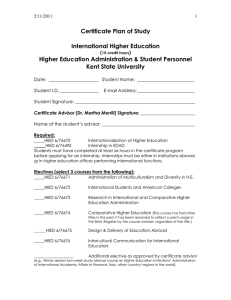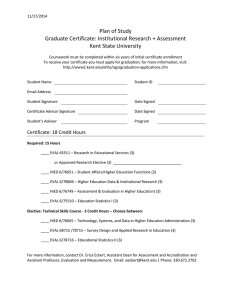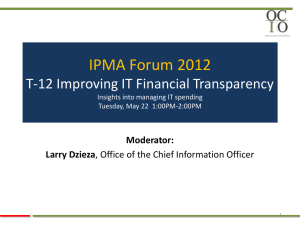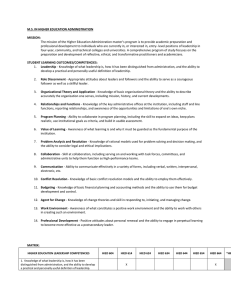ED.D. IN HIGHER EDUCATION ADMINISTRATION MISSION:
advertisement
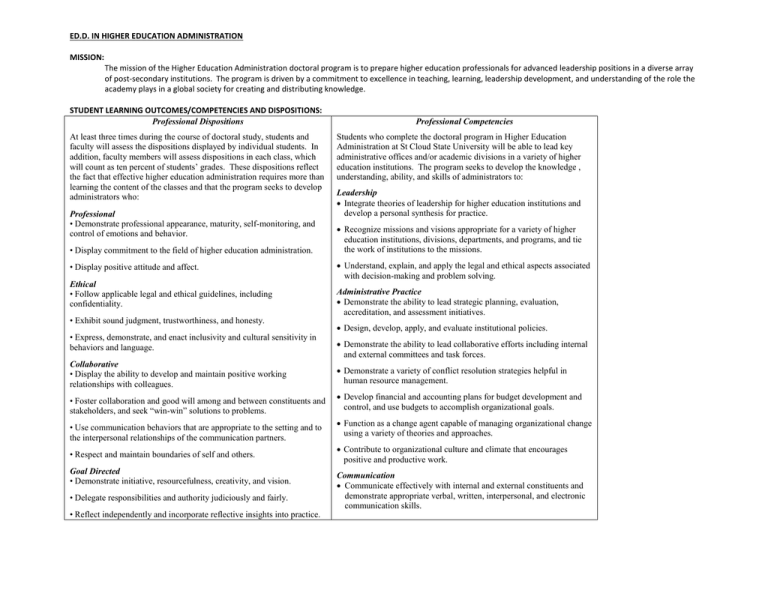
ED.D. IN HIGHER EDUCATION ADMINISTRATION MISSION: The mission of the Higher Education Administration doctoral program is to prepare higher education professionals for advanced leadership positions in a diverse array of post-secondary institutions. The program is driven by a commitment to excellence in teaching, learning, leadership development, and understanding of the role the academy plays in a global society for creating and distributing knowledge. STUDENT LEARNING OUTCOMES/COMPETENCIES AND DISPOSITIONS: Professional Dispositions At least three times during the course of doctoral study, students and faculty will assess the dispositions displayed by individual students. In addition, faculty members will assess dispositions in each class, which will count as ten percent of students’ grades. These dispositions reflect the fact that effective higher education administration requires more than learning the content of the classes and that the program seeks to develop administrators who: Professional • Demonstrate professional appearance, maturity, self-monitoring, and control of emotions and behavior. • Display commitment to the field of higher education administration. • Display positive attitude and affect. Ethical • Follow applicable legal and ethical guidelines, including confidentiality. • Exhibit sound judgment, trustworthiness, and honesty. • Express, demonstrate, and enact inclusivity and cultural sensitivity in behaviors and language. Professional Competencies Students who complete the doctoral program in Higher Education Administration at St Cloud State University will be able to lead key administrative offices and/or academic divisions in a variety of higher education institutions. The program seeks to develop the knowledge , understanding, ability, and skills of administrators to: Leadership Integrate theories of leadership for higher education institutions and develop a personal synthesis for practice. Recognize missions and visions appropriate for a variety of higher education institutions, divisions, departments, and programs, and tie the work of institutions to the missions. Understand, explain, and apply the legal and ethical aspects associated with decision-making and problem solving. Administrative Practice Demonstrate the ability to lead strategic planning, evaluation, accreditation, and assessment initiatives. Design, develop, apply, and evaluate institutional policies. Demonstrate the ability to lead collaborative efforts including internal and external committees and task forces. Collaborative • Display the ability to develop and maintain positive working relationships with colleagues. Demonstrate a variety of conflict resolution strategies helpful in human resource management. • Foster collaboration and good will among and between constituents and stakeholders, and seek “win-win” solutions to problems. Develop financial and accounting plans for budget development and control, and use budgets to accomplish organizational goals. • Use communication behaviors that are appropriate to the setting and to the interpersonal relationships of the communication partners. • Respect and maintain boundaries of self and others. Goal Directed • Demonstrate initiative, resourcefulness, creativity, and vision. • Delegate responsibilities and authority judiciously and fairly. • Reflect independently and incorporate reflective insights into practice. Function as a change agent capable of managing organizational change using a variety of theories and approaches. Contribute to organizational culture and climate that encourages positive and productive work. Communication Communicate effectively with internal and external constituents and demonstrate appropriate verbal, written, interpersonal, and electronic communication skills. Open to Personal Growth • Demonstrate adaptability when confronted with ambiguity, change, and conflict. • Receive, interpret, and use constructive feedback. Articulate the importance of and create diverse teaching, learning, and working environments that value the uniqueness of all constituents affiliated with the organization. Articulate the need for life-long learning in a global and international environment. Learning and applying new knowledge Conduct research to expand knowledge and inform policy making. Evaluate research and use others’ findings to inform administrative practices. MATIRX: X X X X X X X X X X X X X X X X X X X X X X X X X X X X X X X X X X X X X X X X X X X X X X X X X X X X X X X X X X X X X X HIED 899 HIED 823 HIED 822 HIED 821 HIED 820 HIED 813 HIED 812 X X X X HIED 811 HIED 810 HIED 809 HIED 808 HIED 807 HIED 806 HIED 805 HIED 804 HIED 803 HIED 802 Students who complete the doctoral program in Higher Education Administration at St Cloud State University will demonstrate the ability to: 1. articulate a philosophy of leadership for the contemporary academy. 2. develop a mission and vision appropriate for a variety of higher education institutions, divisions, departments, and programs, and tie the mission to the work of the institution. 3. lead key administrative offices and academic divisions in a variety of higher education institutions. 4. lead strategic planning, evaluation, accreditation, and assessment initiatives. 5. understand, explain, and apply the legal and ethical aspects associated with decision-making and problem solving. 6. design, develop, and evaluate policies for various segments of an institution. 7. lead collaborative efforts including internal and external committees and task forces. 8. communicate effectively with internal and external constituents. 9. demonstrate a variety of conflict resolution strategies helpful in human resource management. 10. develop financial and accounting plans for budget development and control, and use budgets to implement policy. 11. articulate the importance of creating and supporting a diverse teaching, learning, and working environment that embraces the uniqueness of all constituents affiliated HIED 800 Program Outcomes (15): HIED 801 Program Requirements Ed.D. in Higher Education Administration X X X X X X X X X X X X X X X X X X X X X X X X X X X X X X with the organization. 12. function as a change agent, managing organizational change using a variety of theories and approaches. 13. create an organizational culture and climate that maintains morale. 14. conduct research and use findings for policy and administrative purposes. 15. articulate the need for life-long learning in a global environment. X X X X X X X X X X X X X X X X X X X X X X X X TIMELINE/COURSE SEQUENCE: Fall Semester Spring Semester Summer Sessions Year 1 HIED 800 (3 credits) HIED 807 (3 credits) HIED 810 (3 credits) HIED 820 (3 credits) HIED 801 (3 credits) HIED 802 (3 credits) Year 2 HIED 809 (3 credits) HIED 811/821 (3 credits) HIED 804 (3 credits) HIED 808 (3 credits) HIED 806 (3 credits) HIED 812/822 (3 credits) Year 3 HIED 803 (3 credits) HIED 805 (3 credits) HIED 899 (3 credits) HIED 813/823 (3 credits) HIED 899 (3 credits) Interdisciplinary (3 credits) HIED 899 (6 credits) X X X X X X X X X X X X X X X X X X X
